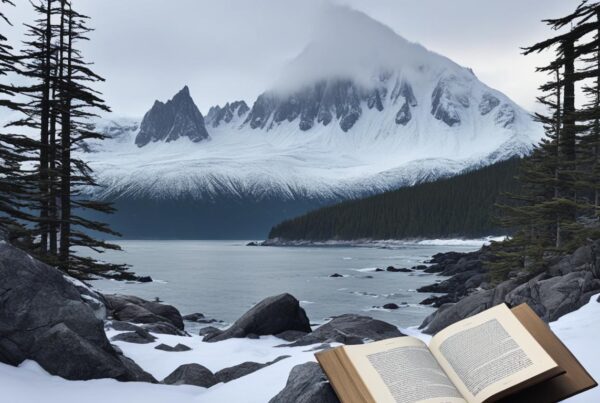In this audiobook review, we take a closer look at Colson Whitehead’s acclaimed novel, The Nickel Boys. The book takes us on a thought-provoking journey, exploring themes of systemic racism, resilience, and redemption. Set against the backdrop of Jim Crow-era Florida, this powerful tale is brought to life through the expert narration of JD Jackson in the audiobook version.
Key Takeaways
- Discover the captivating narrative of Colson Whitehead’s The Nickel Boys in the audiobook format.
- Explore the powerful themes of systemic racism, resilience, and redemption that are central to the story.
- Glimpse into the context and significance of this critically acclaimed work.
- Meet the compelling characters who drive the narrative forward in The Nickel Boys.
- Analyze the symbolic elements and allegorical layers in the novel that highlight broader societal issues.
Introduction to The Nickel Boys
Colson Whitehead’s The Nickel Boys is a gripping novel that follows the lives of Elwood Curtis and Turner, two African American boys who are sent to a reform school in Florida in the 1960s. The novel explores themes of racial injustice, resilience, and the ability of the human spirit to overcome adversity in the face of oppression.
Through vivid prose and well-crafted characters, Whitehead creates a powerful narrative that reflects the harsh realities of life for people of color in America during this tumultuous time in history. The novel has received critical acclaim and has quickly become a must-read for anyone interested in understanding the complexities of the human experience.
In this section, we provide an overview of the plot, characters, and authorship of The Nickel Boys. We will explore the context and significance of this critically acclaimed novel, setting the stage for a more in-depth examination of its themes and impact.
Setting and Historical Context
Colson Whitehead’s The Nickel Boys is set in the southern United States during the 1960s. The novel takes place mainly in a fictional reform school in Florida, the Nickel Academy, which is based on a real institution, the Arthur G. Dozier School for Boys.
The historical context of the novel is heavily influenced by the Civil Rights Movement, Jim Crow laws, and the prevalence of systemic racism in the United States during this time. The characters in The Nickel Boys struggle with the realities of segregation and the constant threat of violence and discrimination.
The Effects of Jim Crow Laws
The Jim Crow laws were state and local laws in the United States that enforced racial segregation and discrimination against Black Americans from the late 1800s to the mid-1960s. The segregation policies were enforced in various aspects of everyday life, including education, housing, and public transportation.
The Nickel Boys portrays how the Jim Crow laws had a devastating impact on Black Americans and how they were constantly subjected to violence and abuse.
| Effects of Jim Crow Laws | Description |
|---|---|
| Segregation in Education | Under Jim Crow laws, schools were segregated by race, with Black schools receiving fewer resources and lower quality education. |
| Housing Discrimination | Jim Crow laws allowed for housing discrimination against Black Americans, which resulted in unequal access to living conditions and quality of life. |
| Voter Suppression | Jim Crow laws made it difficult for Black Americans to vote, through measures such as poll taxes and literacy tests. |
| Employment Discrimination | Black Americans were often denied jobs or paid lower wages due to Jim Crow laws, which limited their economic opportunities and contributed to poverty. |
Overall, The Nickel Boys provides a powerful portrayal of the impact of systemic racism and serves as a reminder of the ongoing struggle for racial justice in society.
Themes Explored in The Nickel Boys
Colson Whitehead’s The Nickel Boys is a poignant tale that explores a multitude of themes relevant to contemporary society. Through his writing, Whitehead shines a light on the pervasive issues of systemic racism, discrimination, and inequality that persists even today. He deftly portrays the impact of these themes on the characters and the world at large.
The Impact of Systemic Racism
One of the central themes of The Nickel Boys is the impact of systemic racism on individuals and society. The story takes place against the backdrop of the Civil Rights Movement in the 1960s, where the racial divide was at its peak in America. Whitehead eloquently portrays the struggle for progress and the challenges faced by African Americans in their fight for equality.
The Power of Resilience and Redemption
Whitehead’s portrayal of the characters in The Nickel Boys imbues the story with hope and resilience. The novel emphasizes the strength of the human spirit to overcome even the most challenging circumstances and emerge triumphant. Elwood Curtis and Turner represent the struggle for redemption and the possibility of a better future, despite the challenges they face.
The Illusion of Justice
The Nickel Boys also exposes the illusion of justice and the moral ambiguity that underpins the justice system in America. Whitehead reveals the flaws and biases in the system, leading readers to question the fairness and effectiveness of the criminal justice system.
Crafted with Whitehead’s exceptional skill, The Nickel Boys is a thought-provoking and emotionally resonant novel that delves deep into critical societal issues. Its powerful themes have left a profound impact on readers, reflecting the enduring relevance of Colson Whitehead’s works.
Protagonists and Supporting Characters
In The Nickel Boys, the author introduces us to a cast of compelling characters who drive the narrative forward, each with a unique story and impact on the plot.
Elwood Curtis – The Resilient Protagonist
Elwood Curtis is the main character of the novel, a determined and optimistic young man from Tallahassee who is wrongfully convicted and sent to The Nickel Academy. Despite being subjected to the harsh realities of the institution, Elwood remains steadfast in his beliefs and hopeful for a better future.
Turner – The Enigmatic Turner
Turner is Elwood’s friend and companion at The Nickel Academy, but their personalities and perspectives clash. Whereas Elwood is idealistic, Turner is cynical and sees the worst in people and situations. Despite their differences, Turner’s complex motivations and actions throughout the novel make him a compelling character.
The Supporting Cast
Beyond the main characters, The Nickel Boys features a diverse and nuanced supporting cast. From the enigmatic Griffith to the ruthless Spencer, each character adds a layer of complexity and intrigue to the plot, highlighting the deep-seated issues of injustice and inequality in society.
The table below showcases the primary protagonists and supporting characters in The Nickel Boys, their characterization, and their impact on the plot:
| Character | Characterization | Impact on Plot |
|---|---|---|
| Elwood Curtis | Resilient, idealistic, determined | Drives the narrative forward, exposes the injustices at The Nickel Academy |
| Turner | Cynical, mysterious, rebellious | Provides a contrasting perspective to Elwood, reveals the darker side of The Nickel Academy |
| Griffith | Compliant, obedient, conflicted | Highlights the psychological toll of The Nickel Academy on the youth, serves as a foil to Elwood |
| Spencer | Ruthless, power-hungry, manipulative | Personifies the corruption and abuse at The Nickel Academy, represents the worst of the institution |
Narrative Style and Structure
Colson Whitehead’s narrative style and unique structure in The Nickel Boys contributes to the novel’s emotional impact. The story’s nonlinear structure, characterized by a series of flashbacks, heightens the sense of tension, suspense, and uncertainty that surrounds the central characters.
The use of first-person narration enables readers to connect more intimately with the protagonist, Elwood Curtis, and to empathize with his struggles and triumphs. Whitehead’s descriptive language and vivid imagery provide readers with a sensory experience, immersing them in the world of the Nickel Academy.
Whitehead’s narrative choices also offer insightful commentary on larger societal issues, such as the pervasive nature of systemic racism. For example, the use of different temporalities highlights how the traumatic events of the past continue to impact the present.
Elements of Narrative Style and Structure
| Narrative Technique | Description |
|---|---|
| Nonlinear Structure | Flashbacks, jumping between different timelines and perspectives create suspense and tension. |
| First-person Narration | Helps readers empathize with the characters and makes the story more relatable. |
| Descriptive Language and Imagery | Creates a sensory experience for the reader, making them feel more immersed in the story. |
| Social Commentary | Narrative style and structure offer insightful commentary on broader societal issues and injustices. |
Audiobook Performance and Narration
The Nickel Boys’ audiobook adaptation is a stunning rendition of Colson Whitehead’s literary work. The narrator, JD Jackson, skillfully brings the characters and plot to life through his expert performance and narration.
Jackson’s delivery perfectly captures the tense and emotional moments of the book, creating an immersive experience for listeners. His portrayal of protagonist Elwood Curtis effectively conveys the character’s struggles and desire for justice, while his depiction of the supporting characters adds depth and nuance to the narrative.
The audiobook format allows the listener to fully appreciate the rhythm and cadence of Whitehead’s prose, adding another layer of richness to the storytelling. By listening to the audiobook version, readers can gain a new perspective on the text, enhancing their overall understanding and appreciation of the novel.
The audiobook adaptation of The Nickel Boys is a captivating listening experience that adds to the power and impact of Colson Whitehead’s masterful storytelling.
Critical Reception and Awards
The Nickel Boys has received widespread acclaim from critics and readers alike. The novel was a finalist for the Pulitzer Prize for Fiction in 2020. It won the Kirkus Prize for Fiction in the same year, with the judges praising Colson Whitehead’s “percussive prose” and “crystalline insights”.
The novel has also been lauded for its powerful themes and profound social commentary. Publishers Weekly called it a “stunning novel of impeccable language and startling insight”, while NPR described it as a “morally enlightening and emotionally stirring read”.
Awards and Nominations:
| Year | Award | Category | Outcome |
|---|---|---|---|
| 2020 | Pulitzer Prize for Fiction | Finalist | Shortlisted |
| 2020 | Kirkus Prize | Fiction | Winner |
| 2020 | National Book Critics Circle Award | Fiction | Shortlisted |
| 2020 | Goodreads Choice Award | Fiction | Winner |
The numerous awards and nominations attest to the impact The Nickel Boys has made in the literary world. Its exploration of race, class, and justice in America has resonated deeply with readers and critics, cementing Colson Whitehead’s place as one of the most important voices in contemporary fiction.
Historical Accuracy and Connection to Reality
Colson Whitehead’s The Nickel Boys depicts the harsh realities of a boys’ reform school, drawing inspiration from the infamous Arthur G. Dozier School for Boys, a Florida-based institution with a history marred by allegations of abuse and murder. While the characters and plot of the novel are fictional, Whitehead meticulously researched the historical context of the era and the real-life incidents surrounding Dozier, ensuring a degree of historical accuracy that adds to the poignancy of the narrative.
Through his writing, Whitehead connects readers to the reality faced by young boys in the 1960s who were subjected to heinous treatment at the hands of those in power. He demonstrates the impact of systemic racism on institutions, exposing the darker side of America’s history. The novel’s representation of the cure concept, which permitted officials to detain boys in the school without arrest, trial, or representation, is distressingly similar to the real-life practices of the Dozier School. By drawing on these factual elements, Whitehead successfully creates an immersive and impactful reading experience that inspires reflection and introspection.
Impact and Discussion
The Nickel Boys is a book that has had a considerable impact on readers and society as a whole. The story tackles difficult subjects such as systemic racism, abuse, and redemption, which can lead to thought-provoking discussions. Through Whitehead’s vivid depiction of the historical context, this audiobook allows audiences to connect with the characters and their experiences. The novel has received critical acclaim and awards that underscore its impact and significance.
Since its publication, The Nickel Boys has sparked widespread discussions about American history and the ongoing impact of systemic racism on society. The novel has also prompted conversations about the role of institutions and individuals in creating a more just and equitable society. Through the story’s themes and characters, readers can gain insights into their experiences and begin to develop a deeper understanding of the complexities of these issues.
Reflection Questions:
- What impact has The Nickel Boys had on you personally?
- How has The Nickel Boys contributed to important discussions about American history and systemic racism?
- What are your thoughts on the critical reception and awards received by The Nickel Boys?
Symbolism and Allegory in The Nickel Boys
The Nickel Boys is replete with symbolism and allegory that elevate the story above mere fiction. The title, for example, refers to the nickname of a brutal reformatory school where the two protagonists are sent. It speaks to the dehumanizing effects of incarceration, especially on young Black men, and the institutionalized racist practices that perpetuate them.
The novel also employs subtle imagery to underscore the themes of oppression and resistance. For instance, the recurring motif of keys symbolizes power and agency, with characters either acquiring or losing them over the course of the narrative. Additionally, the contrasting colors of black and white, as well as the descriptions of fire and water, serve as potent metaphors for the racial and social divide.
The allegorical layers of the story are also evident in the characters and their journeys. Elwood Curtis embodies the ideals of the civil rights movement, while Turner represents the pragmatic approach of survival in an unjust society. Their intertwined fates reflect the complexities of Black identity and the struggle for liberation in America.
Symbolism and Allegory Table
| Symbol/Allegory | Description |
|---|---|
| The Nickel Boys | Refers to the reformatory school where the protagonists are sent and symbolizes the dehumanizing effects of incarceration on Black youth. |
| Keys | Symbolize power and agency in the face of oppression, with characters either gaining or losing them throughout the story. |
| Black and White | The contrasting colors represent the racial and social divide in America. |
| Fire and Water | These elements serve as metaphors for the destructive nature of racism and the cleansing effect of resistance and redemption. |
| Elwood Curtis | Represents the idealistic aspirations of the civil rights movement and the struggle for equality. |
| Turner | Personifies the pragmatic approach of survival in an unjust society and the pursuit of individual freedom. |

Conclusion
Colson Whitehead’s The Nickel Boys is a riveting audiobook that captures the reader’s attention from the very beginning. This audiobook review has explored the various thematic elements that make this literary work a masterpiece. From the historical context to the character development, and the narrative style, Whitehead’s storytelling prowess comes through brilliantly.
The audiobook adaptation of The Nickel Boys is a compelling way to experience this thought-provoking work. The narration and performance elevate the story, making it all the more poignant. The critical acclaim and recognition that The Nickel Boys has received is a testament to its impact on readers and society as a whole.
Whether you are a fan of historical fiction, coming-of-age stories, or social commentary, The Nickel Boys will not disappoint. This powerful narrative sheds light on important societal issues and invites readers to engage in meaningful conversations. It is a must-read for anyone seeking to deepen their understanding of the human experience in the face of adversity.



